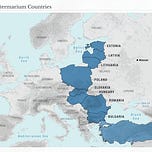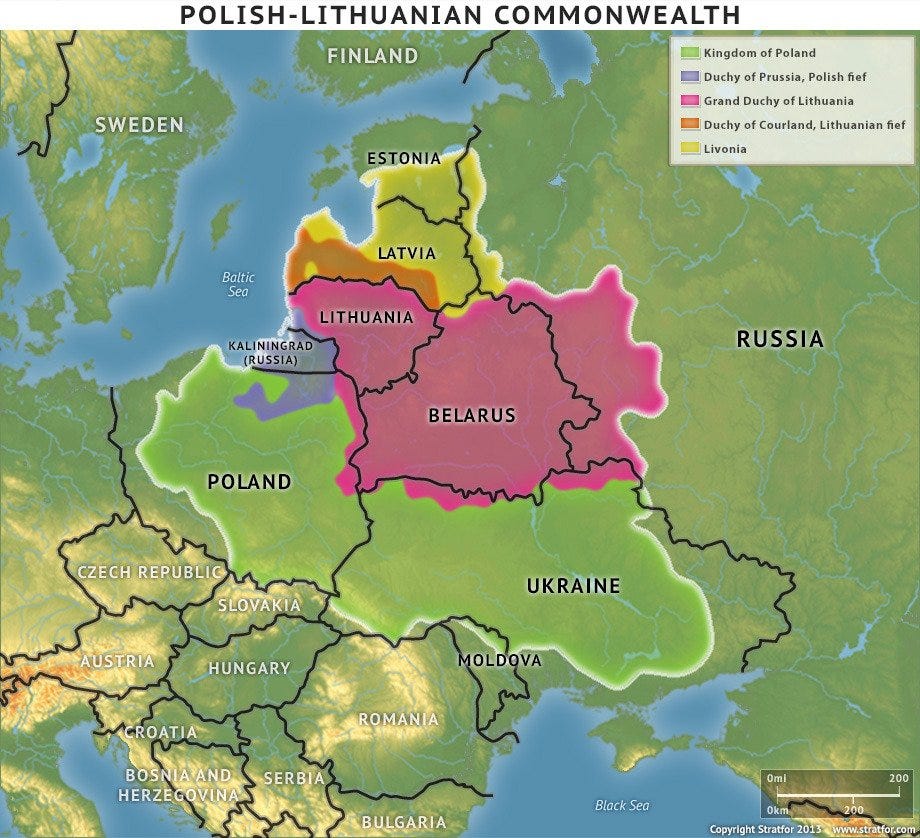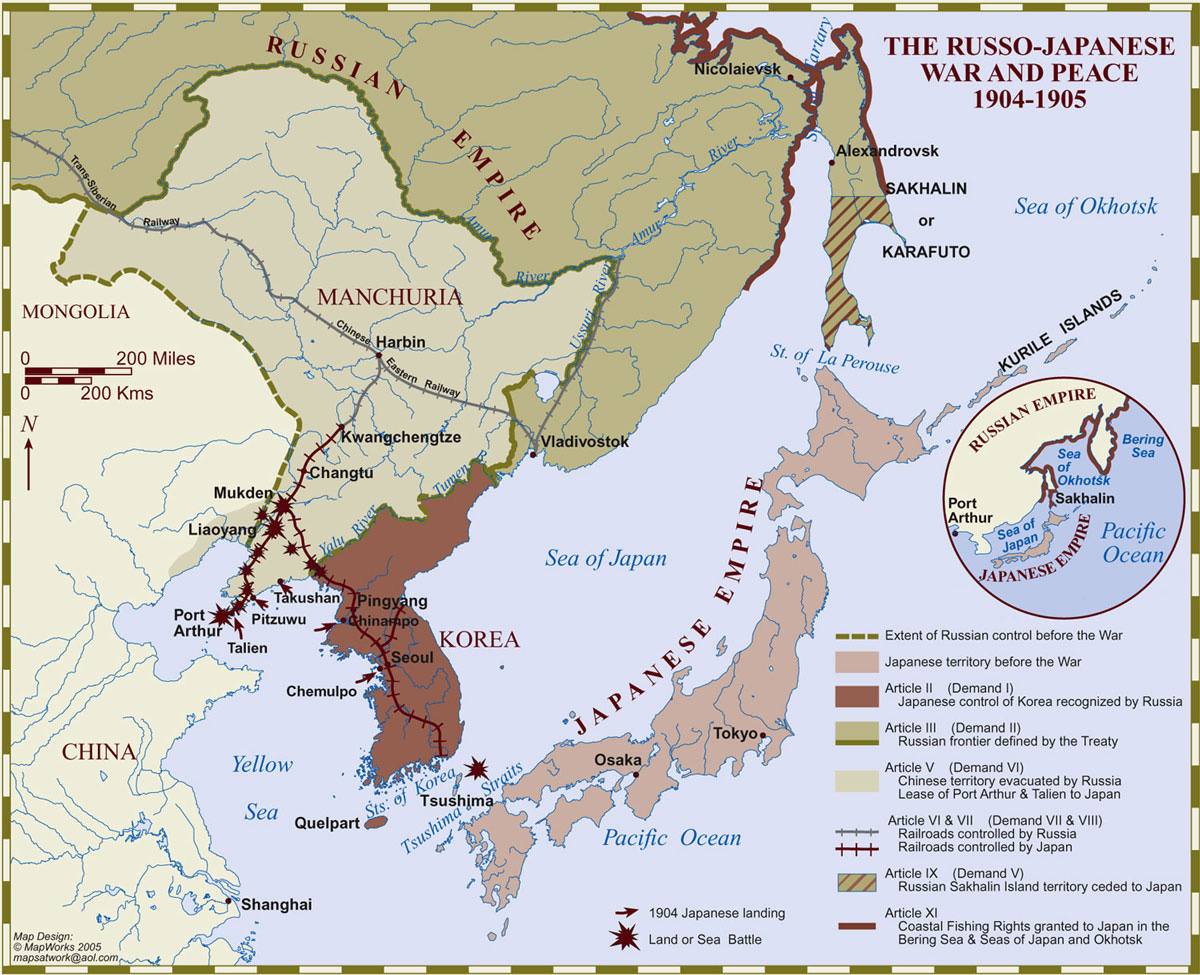On Wednesday Sept. 10, multiple drones violated Polish airspace. They were eventually shot down by NATO fighter jets. Russia’s defense ministry denied it was behind the incursion. The chief of Belarus’s general staff claimed Belarus also shot down some wayward drones that accidentally crossed into its airspace due to “electronic jamming.” U.S. President Donald Trump suggested that the drone incursion could have been a mistake, but subsequently declared his intent to impose harsh sanctions on Russia… if NATO member states agreed to do so as well. President Trump also said Europe should impose 50-100% tariffs on China to encourage Beijing to push on Moscow to end the war.
Immediately, I reached out to an old friend, Jacek Bartosiak, founder of the influential Polish geopolitical publication Strategy&Future, to get his thoughts. Jacek has penned several best selling books in Poland on geopolitics and is also the co-founder of Play of Battle, a war-gaming studio that will release its first demo of a geopolitics-suffused internet war game in the coming weeks, one that this former Age of Empires nerd is anxious to experience. It was difficult to get Jacek’s schedule to line up with mine, as he was highly sought after in Polish media after the 10th, but I snagged him for a weekend recording on Saturday (Sept. 13).
The timing was exceptional, I only wish we had been publishing the episode live, because an hour before we started recording, Polish authorities shutdown Lublin airport in Eastern Poland and warned of potential further incursions into Polish airspace. Separately, Romania scrambled fighters and claimed it had detected an unauthorized UAV in its airspace as Russia launched an an attack on Ukraine near the Romanian border. France and other NATO members have also since promised to deploy additional fighter jets and material to Eastern Europe, while Poland and Lithuania announced repositioning of 40,000+ thousand troops ahead of Russian-Belarusian military exercises.
My recording with Jacek was, as always, exceptional. Jacek is part of a vocal minority in Polish politics that wants to see Poland shed its status as, in his words, a “U.S. vassal state,” and instead recognize Poland as heir to the once-mighty Polish-Lithuanian Commonwealth, once the largest state in Europe before its steady descent and eventual partition into oblivion in the 19th century. To that end, Jacek believes a political revolution is happening in Warsaw, one that recognizes a “post-NATO” era and the importance of the Intermarium.
The Intermarium is a Polish geopolitical concept that literally means"between the seas." Invented by Józef Piłsudski after World War I, the concept imagines a powerful regional bloc to counter Russian and German influence, echoing the historical Polish–Lithuanian Commonwealth. Piłsudski proposed a federation of Central and Eastern European states, primarily from the Baltic, Black, and Adriatic seas. Due to its geographic position and long-term strategic rivalry with Russia, Turkey is also a critical component of the Intermarium, and is arguably the country that has most seriously pursued the strategic path Jacek argues that Polish decision-makers should be embracing with all due haste.
I love talking to guests like Jacek because they bring an entirely different perspective from the regular voices that we hear in generic English-speaking media. Jacek offers a distinctly Polish point of view. At multiple spots during our conversation, I stopped to write down points that made me stop and consider my preconceptions, including:
The idea that Ukraine, not the U.S. has all the “cards,” and that President Trump’s treatment of Zelenskyy in the Oval Office earlier this year has led to a decisive break between the U.S. and Europe.
That Ukrainian and Russian soldiers are respectively “the best soldiers in the world,” and that as they do battle, we are witnessing “the biggest change in military tactics since the French Revolution.” Jacek noted that Ukraine has fielded 100 brigades that have been fighting Russia’s army for 4 years now — it is easy to dismiss what an accomplishment this is, especially when considering Ukrainian demographics.
Russia’s size has always functioned as a source of great strength, preventing external powers (like the Polish-Lithuanian Commonwealth, Napoleon, and Hitler) from conquering Moscow due to the logistical nightmare of attempting to conquer Russia — but in a warzone dominated by drones, and in which Ukraine is quickly developing conventional and asymmetric deep-strike capability, this strength becomes a weakness because Ukraine can hit anywhere — and Russia cannot defend everywhere.
Poland has relied for too long on a strategy of strategic deterrence — Ukraine has showed that only deterrence by punishment works.
China may be able to position itself as a key player, playing a similar role that the U.S. played in negotiating peace between Russia and Japan in their early 20th century war. Teddy Roosevelt won a Nobel Peace Prize for his efforts then. Geopolitical nerds know all about the “Reverse Kissinger” — Jacek introduces the idea of the “Reverse Portsmouth Treaty” as a strategic opportunity for China. (I should probably do a whole post on the Portsmouth Treaty at some point.)
Jacek insists the most probably scenario is that Intermarium countries reach out to China directly to make a grand trade bargain, because ultimately, both China and the Intermarium want Russia constrained and no longer believe the U.S. has a role to play in Eurasia as its power recedes.
In Eastern Europe, it is clear that a post-NATO era has already begun. Ukraine only talks about NATO security guarantees as political fluff, what Ukraine truly believes in is shared interests between militarily capable powers, like Sweden, Turkey, and, Jacek hopes, Poland. Russia’s drone attacks tested Poland and NATO’s military, social, and political responses, and Poland/NATO failed these tests.
Ironically, the more Putin pushes, the more he may create the exact sort of political change Jacek hopes for in Poland.
The lynchpin of the region is Belarus. If Belarus could be turned, it could change everything — and Belarus is, of course, governed by the mercurial dictator Lukashenko, who has clung to power despite several attempts to unseat him or alter his deeply pro-Russian orientation.
The hardest part of all this to me is understanding what Russia is doing.
I didn’t think Russia would invade Ukraine because it would so obviously not be in Russia’s interests - as the expansion of NATO and the rise of Europe in supporting Ukraine’s military has clearly showed. Ditto a Russian drone incursion into Poland.
The default European and even Polish position is passivity and apathy… but push any nation’s back against a wall and eventually they will respond. Maybe Jacek is right — perhaps Putin’s goal was to show how weak and feckless NATO’s security guarantees are — but in so doing, he provides the justification needed for countries on the frontline with Russia to eschew delusional thinking and become the very existential threats Putin fears.






